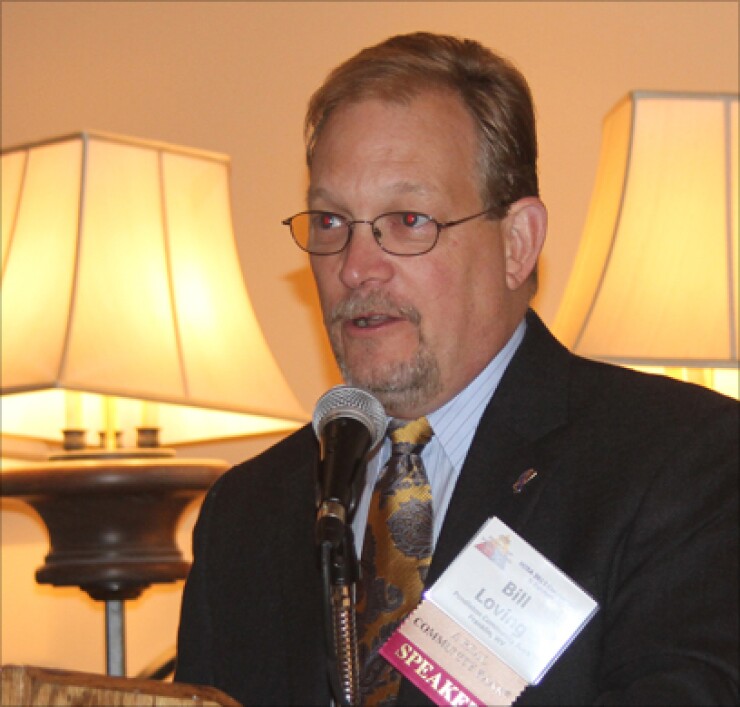-
Bob Kottler, an executive at Iberiabank, hopes the Consumer Bankers Association can help shape the agency’s rulemaking process in 2013.
December 10 -
Though regulators gave community banks an exemption for balloon mortgages, they carved out such a narrow definition that some banks would be forced to stop making them.
February 25

If the ranks of community banks are going to shrink, William Loving Jr., chief executive of Pendleton Community Bank, believes they will go down fighting.
For years, industry experts have predicted that higher regulatory costs and artificially low interest rates would spur massive consolidation. There is a growing belief that many smaller banks must sell to wring out costs and
Good luck convincing Loving, who is also the incoming chairman of the Independent Community Bankers of America. Indeed, there will be contraction, but he asserts that it won't be as severe as many predict.
"Community bankers are a certain breed — we are fighters," he says. "They have always found a way to work through their challenges, and many will find the key to success again."
Finding relief from regulatory pressure is Loving's top priority for the upcoming year. He has heard a "mixture of concerns" from community bankers about regulation rather than complaints focused on any specific reform
"The layering of regulations over time is a big concern to our members," Loving says. "As a result of that, most costs incurred for compliance go straight to the bottom line."
Last month, the ICBA released its Plan for Prosperity, a platform that outlines its policy objectives for the 113th Congress. Its key points include exempting smaller banks from certain mortgage reforms, reducing annual privacy notices and easing municipal advisor registration requirements.
The ICBA wants a change to the structure of the Consumer Financial Protection Bureau to create a commission to oversee the bureau, Loving says.
The ICBA will work with other trade groups, including the American Bankers Association, to achieve its objectives when appropriate, depending on the issue. But the group is willing to go it alone "if that's in our best interest," Loving says.
Besides complaints about regulation, small banks are focused on addressing pressure on net interest margins, soft loan demand and efficiency efforts, he says.
As CEO and president of Pendleton Community in Franklin, W.Va., Loving faces many of these concerns. The $262 million-asset bank, which serves five counties, has struggled to book loans. The bank's net loans and leases at Dec. 31 fell about 1% from a year earlier, to $187 million, according to the Federal Deposit Insurance Corp.
Pendleton Community is based in a town with a population of less than 800 and focuses largely on agricultural loans — mostly in the poultry industry — and small-business lending. It also makes residential mortgages.
The bank's customers confront many of the same pressures that are afflicting other communities, Loving says. Limited job openings are forcing people to travel long distances for work. West Virginia's economy has historically relied on coal production, but it is starting to diversify.
Still, the state emerged from the financial crisis in a condition that was "very stable from a banking standpoint and economic prospective," Loving says. West Virginia normally avoids the extreme highs and lows that take place in other states, and that was true for the latest crash. The state's unemployment rate has stayed below the national rate in recent years, according to the U.S. Bureau of Labor Statistics.
Loving also wants to use his upcoming term to strengthen the ICBA's member engagement and continue to educate the public about the differences between community banks and their larger counterparts.
To strengthen engagement, the ICBA will continue notifying members about issues and initiatives that must be addressed. The association also plans to use next week's national convention in Las Vegas to energize its membership. The event features workshops on topics such as social media, mergers and acquisitions and, of course, regulation, which is always a crowd favorite, Loving says.
Martin Gruenberg, the FDIC's chairman, and Richard Cordray, the CFPB's director, are set to speak on Wednesday. Tom Curry, Comptroller of the Currency, and football legend Joe Montana will speak on Thursday.
As for making the distinctions between small and large banks, the ICBA will continue with a campaign that promotes shopping, dining and banking locally.
"We are like the small businesses that we serve," Loving says. "We thrive when our customers do. We are the economic engines that drive our communities."





